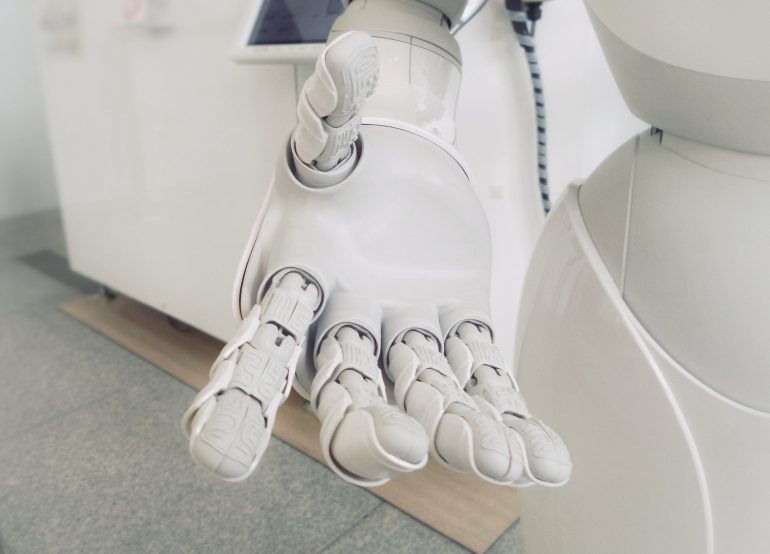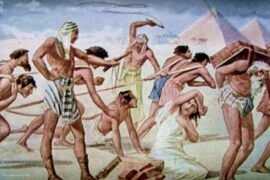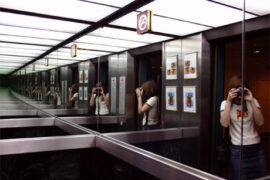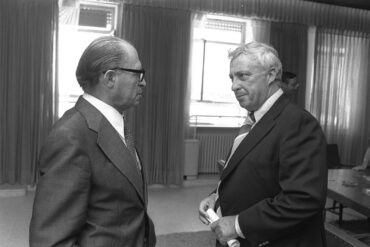(written in 2017 as a response to Life 3.0, by Max Tegmark)
To you, computer scientists, who study
how to construct the Artificial Mind
while wondering what it bodes for human beings,
comes a poor poet, pleading for attention.
I write this in blank verse, because I’ve found
verse helps me see the contour of my thought
and gives me hope others will also see it.
Perhaps you’re unaccustomed to this language,
may find it somewhat hard to focus on,
though easier mine for you, than yours for me.
You work with numbers all the time, yet still
can think in words, if only to explain
to us a little of your undertaking,
and I must hope you grant that with these tokens
something significant can still be said.
I’ve just come back from Oxford, where I spoke
at a conference on “The Prophetic Word.”
Oxford’s a strange place now. The campus buildings
in styles from Saxon to Victorian,
stolid, aspiring, classically balanced,
cornice and column, arch and architrave,
with varying embellishments in which
the old stonemason’s pride and patience shone,
look down on choking traffic, storefronts full
of flimsy clothes and knickknack souvenirs,
and crowds dressed sloppily, attuned to cellphones.
Those who once taught and learned here never dreamed
the wonders of invention which these know;
yet they knew much those present have forgotten,
had time for depth and nuance now unguessed.
Before the conference I had taken time
to visit the Lake District, Wordsworth’s home,
and could still sense a landscape that had grown
friends, over centuries, with its human dwellers,
could indeed feel how Wordsworth’s lines transmitted
from steep and vale a quiet resonance.
Of course it’s artificially maintained.
Those Herdwick sheep – the sheep of Wordsworth’s time –
aren’t profitable now; they’re subsidized;
the farmers grumble, but efficiency
would probably result in factory-farms,
as industry paints over local color
with garish uniformity. There’s a process
going on here, likely no one’s fault.
“We must, because we can,” this age’s motto.
It seems a different necessity
than that which limited what we could do,
so that we built more slowly what could please
and interest the contemplating eye
for longer than the startling first impression
and that could stand, not speedily replaced —
endear itself to memory, and shape
to some extent the dwellers’ minds to hold
things dear, and feel they live and move among
objects not utterly inanimate.
Those who exult in breaching every limit
have ceased to understand this; and it seems
to follow, that they cease to understand
the boundenness of humanhood – of any
life, for that matter – to the limitations
of form. We know and feel because we are
limited. We live because we have
to die. And, knowing this, we sometimes reach
beyond the bounds of nature and its laws
to That which laid them down, and which then blew
into this world the breath of life that’s something
more than computation.
I have heard
that naked dwellers of the Amazon
have called our world “the dead world.” That may be
an urban legend, seeing they had not traveled;
but such an appellation might occur
to a visitor who grasps for the first time
what it might be to live just among living
trees and plants and beasts and birds, no stretches
of asphalt, no high towers of glass and steel.
Thus when you speculate about “life spreading
into the cosmos,” I’d ask if you mean life
or gadgets. “A world of made,” as Cummings said,
“is not a world of born.”
Speaking of which,
in all Max Tegmark’s book (and I’ve read Kurzweil’s
as well) there’s nothing about motherhood.
I guess the plan’s that babies will soon grow
in artificial wombs, till artificial
arms receive them, electronic voices
sing optimized lullabies and instruct them
in speech and games, of course with due adjustments
to every infant’s nascent character,
so that they won’t grow up dysfunctional
in any way that anyone would notice—
so many things have “slipped beneath the radar”
that it would take a lot to get us worried.
If, influenced by machines, we lose our souls,
who’ll miss them? Who now has the sense to fear it?
The soul: that is the province of religion,
which you folks don’t believe in; it is also
the realm of poetry, which certainly
exists, and which computers have not yet
managed to reproduce. For all their awesome
feats of computation, all their prowess
at chess and Go (games I can’t play at all),
the run of any poetaster’s mill,
such doggerel as the papers used to carry,
is still beyond the reach of such invention.
Those “Turing tests” that challenge us to tell
whether a poem was written by computer –
well, I have missed a couple that were written
by humans trying to imitate computers –
there’s never been a problem getting humans
to act like robots. On the other hand
a certain passage that made little sense
I recognized as being by Gertrude Stein
because, though amphigorical, there was
her human voice in it. I will admit
I have seen one brief poem, haiku-like,
allegedly composed by a computer,
that could have fooled me. In that type of writing
the reader must supply most of the meaning,
and I would guess the program generated
numerous strings incapable of meaning
until this one came up and was selected –
not by computer, you can bank on that.
Perhaps this doesn’t worry you; you think
that your machines will one day solve this riddle
and write some lines that sound like poetry –
if anyone remembers how it sounded
by that time. Or perhaps you could consider,
pending this crowning triumph of your science,
that you may hold a half-truth, after all.
If you can grant this possibility,
perhaps you then will contemplate admitting
the poet and the humanist to councils
on how to render “safe” this artificial
intelligence. Perhaps the answer lies
not in techniques alone, but in our keeping
a grasp on what it is about us humans
that’s worth safeguarding: what it is and how
it is imperiled and how fortified.
You think these super-wise machines will someday
frame their own purposes; but till that happens
there is an interval in which advances
will be, as they have been, employed toward goals
which human drives and human social structures
support and fund. Among them, surely, healing,
and comfort, and convenience; for these boons
we are all deep in debt. But there is greed
(or call it Need, for to go into business
is to accept the laws of the Dismal Science)
which by manipulation undermines
wisdom and virtue, for these dictate thrift;
and there is greed’s close relative, aggression
or will to dominate, which leads in turn
to cruelty, the worst of human nature.
Anything that increases human power
these tendencies are all too quick seize on –
hence infants in their cribs besieged by Commerce,
and Tyranny with new means of surveillance,
and War by ever-direr weapons waged.
If we’re to keep from building hell on all
of earth (and rescue those already there),
we must devise some way to counteract –
I think, not by technology alone –
the power of such tendencies among us
and strengthen those that give and cherish life.
A humanist can easily develop
a grudge against the sciences, whose exploits
have drawn attention from our undertaking
until the latter seems a hobbyhorse,
just fit for those who are weak in mathematics –
The sciences, which make precise predictions
(though heedless of the future their blind rush),
whose truths make our perceptions seem subjective
merely, not to be taken into account,
kept in some lumber-room denoted Culture
prior to being carted to the curb,
even as boisterous Entertainment, raised
by sciences applied as Greed would wish
to powers of inanity undreamt,
drowns out the voices of the heart and of
responsible and consequential thought.
Nor have we humanists made the best use
of this adversity. We have conceded
too much to science’s authority,
deemed ourselves, often, powerless to say
what is, and make things happen; have perhaps,
on losing power. too readily disclaimed
responsibility, discrediting
the quest for beauty and the search for truth,
renouncing any office of instruction,
flirting with cruelty to get attention,
and cultivating jargons to conceal
the nakedness of meaningless prestige
or rival with factitious novelty
the too-real novelties that have eclipsed us.
All these mistakes would need to be unmade
for poetry and humanistic studies
to claim a seat in the counsels of the future.
From those dehumanized “humanities”
bereft of feeling and of reason, both,
one turns for shelter toward the rock of science,
toward objectivity and certain proof,
though we have seen the lens of science misses
something essential. Somehow we must find
a humanistic truth that is not merely
statistical, nor merely relative
to individual whim and situation.
I have some faith that this is possible
if we can but rebuild, reclaim, the powers
of concentration and connected thought
that nourished poetry through previous ages,
so that each one imaginatively grasps
the human situation as a whole
and my responsibility within it.
People have learned to exercise their bodies
to keep the strength too much convenience saps;
likewise we need to exercise the mind
and soul (if you’ll permit me) in those ways
of thought that are not those of calculation.
If humanists and poets, too well trained
to exercises in futility,
have failed to voice this claim, then those whose work
keeps them aware of cause and consequence,
and on whose minds responsibility
does weigh, might deign to hear it nonetheless
and amplify its stifled voice with theirs.
There is a tendency toward vital order
that is expressed in all the arts, but most,
perhaps, in poetry, which deals in words
that are, in turn, attached to things, so that
each poem worth the name is like a model
of a harmonious world, where every thing
takes its own place and strengthens all the rest.
This tendency computers might assist
as it has furthered other purposes;
programs might help affines to find each other
amid humanity’s expanding ocean,
not just for “dating,” but for resonanc
of kindred minds, and for a common effort
toward a rehumanization of the world.
A partnership of humans and computers
is here conceivable, computers serving
to sort the vastness of our information
about the world, till it is graspable
by an intelligence that runs on words –
perhaps not that of some poetic genius
working in his traditional isolation,
rather a network of poetic minds
attuned to one another, and exchanging
perceptions and projections, in a process
unchecked by rivalry that blocks the access
of mind to mind (as Harold Bloom has noticed
in The Anxiety of Influence).
Poets alerted to this tendency
might, for themselves, learn something from computers,
–not only their precision, uninflected
by all that leans upon the human judgment,
but also their unchecked exchange of data.
Computers could remind us of the angels
as the Talmud describes them: totally
obedient to the will of the Creator,
hence higher, in a sense, than human beings,
though farther off from G-d, because they lack
free will, can neither err nor choose the good –
a lesser thing than we, and yet a model,
so that, in acting like them, we surpass them.
A band of poets into whom the current
human plight has thrown the fear of G-d
might in a network of computers find
a platform and a template for a praxis
that could build up a wider consciousness
adequate to the needs of humankind,
able to see the outline of a future
where human being could endure, assisted,
but not eclipsed, by Artificial Mind.
Of course I hope some poets overhear
this speech; but may it also reach your ears –
appeal to you as speakers of the language
that still is common ground for humankind,
which literary specialists, no less
than other specialists, too soon forget.
If in these lines you have perceived some truth,
then help it find a hearing – for this is
the duty of all humans towards the word.





